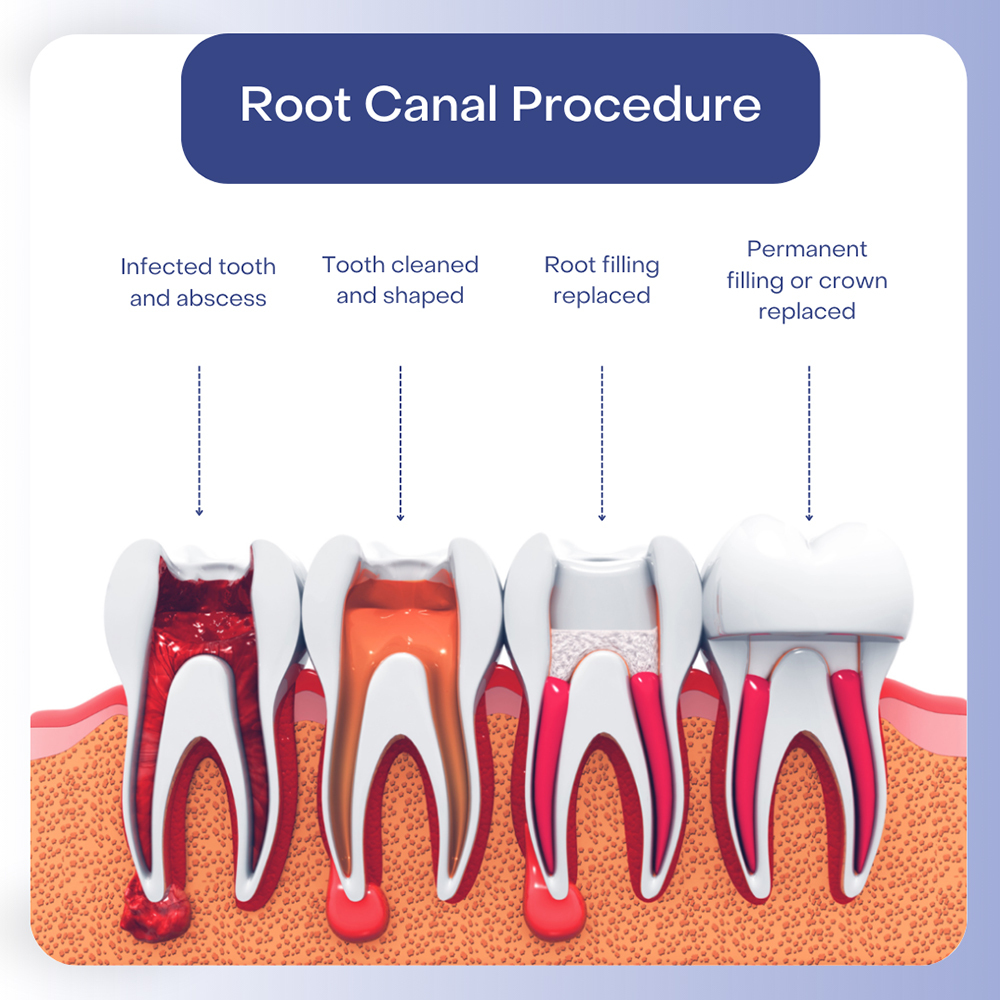Table of contents
 You would need root canal therapy if bacteria naturally found in your mouth can enter your dental pulp, causing inflammation, a condition called pulpitis. An inflamed pulp becomes swollen, increasing pressure inside the pulp chamber and causing a painful toothache.
You would need root canal therapy if bacteria naturally found in your mouth can enter your dental pulp, causing inflammation, a condition called pulpitis. An inflamed pulp becomes swollen, increasing pressure inside the pulp chamber and causing a painful toothache.
Sometimes, trauma can cause tooth pain. If you take a blow to the mouth, it can inflame the pulp, causing it to become swollen and painful.
Bacteria can penetrate the innermost part of your tooth in a couple of ways.
Sometimes, the signs of damage or infection in the tooth are symptomless. If you do have symptoms, they may include the following.
Sometimes, an infected tooth can be painful, but the pain disappears. Unfortunately, this doesn’t mean the infection is gone, as it will not clear up without professional dental care. It can indicate that the tooth nerve causing the pain has died.
An untreated infection can spread to other parts of your body and affect your overall health. You must seek emergency dental care if you begin to feel unwell, have facial swelling, or develop a fever. On rare occasions, a severe infection can be life-threatening.
Ultimately, leaving an infected tooth untreated greatly increases the risk of losing it completely. A severely infected tooth may need to be removed to drain the infection.
When you come to see us, we will take a digital dental x-ray of the tooth to visualize the infection and confirm that you need root canal treatment. Other diagnostic tests that may be used can include:
If you need treatment, rest assured it will not feel painful. It shouldn’t feel any worse than a filling, although root canal treatment is much more technique-sensitive and will take longer to complete.
When searching for effective treatment for severely cracked and decayed teeth that cause significant pain and discomfort, it’s crucial to select a dentist who possesses specialized training and expertise in root canal therapy and other endodontic procedures.
If you’re looking for a root canal specialist nearby, here are a few tips:
At My New Jersey Dentist, we offer convenient access to high-quality dental care for patients requiring root canal therapy. Our clinic prioritizes long-term patient relationships, tailoring treatment plans to address individual needs. For infected root canals, our comprehensive approach includes pulp removal, thorough cleaning, and restorative sealing.
Our board-certified dentists perform endodontic procedures with minimal discomfort, utilizing the latest lasers, a cone beam CT scanner, and the latest powerful dental microscope available in the US to effectively manage inflammation and infection.
Before we begin, we numb the tooth completely and isolate it using a rubber dam so your tooth remains dry during treatment. Treatment then follows several steps outlined below.
Your tooth will need a dental crown to protect and restore it. A tooth becomes nonvital and slightly more brittle without its dental pulp. Although a fully grown adult tooth can survive perfectly well without the pulp, it does need the protection of a full dental crown. The tooth has likely lost a substantial part of its original structure, so the crown restores its strength and appearance.
It may be possible to fabricate a same-day crown. Otherwise, making your crown in our dental laboratory will take one or two weeks. While it is being made, your tooth is protected with a temporary crown.
If your tooth is painful and throbbing, root canal therapy should eliminate this discomfort. However, it’s perfectly normal for the tooth to feel slightly sensitive for a few days after any dental procedure.
You may find eating softer foods for the first few days more comfortable and avoiding chewing on the root-treated tooth. Please try to avoid smoking because it affects healing. Ensure you continue to brush your teeth gently and thoroughly and floss daily.
Your tooth should settle down quickly, but please get in touch with us if it continues to hurt.
Many people will find their tooth problem-free for years or for life after root canal treatment. However, there is a small risk that it could become re-infected later. At this stage, we must assess the tooth carefully to see if it is suitable for root canal re-treatment. This procedure is generally more complex than root canal therapy.
If your tooth does become re-infected, we will discuss the pros and cons of re-treatment, including an approximate idea of the chances of long-term success. If we feel there is only a limited chance of successful re-treatment, we can discuss removing the tooth and replacing it instead. Possible options for replacement include a dental implant or dental bridge.
Professional preventive dentistry can help reduce the risk of common problems like tooth infections. Regular dental exams enable us to pick up on any tooth damage and treat it quickly before a significant infection can develop.
A good oral care routine at home helps to remove most dental plaque, lowering the risk of a bacterial buildup that could infect a tooth. Your oral care routine should include twice daily brushing and flossing once a day using a soft-bristled toothbrush and fluoride toothpaste, preferably a brand that has received the American Dental Association seal of approval.
If you have noticed a tooth has started to twinge or feel sensitive to hot and cold, it could indicate an infection. Please schedule a checkup with us as soon as possible. Prompt treatment could help you avoid a nasty toothache and the need for emergency dental care.

My name is Victoria Kushensky. I am a general dentist dedicated to remaining at the forefront of my field. Combining compassionate care with extensive knowledge, I offer cosmetic and general dentistry services as well as advanced root canal treatments.
I earned my Doctor of Dental Surgery (DDS) degree from the esteemed New York University College of Dentistry. Throughout my career, I have honed my skills in various dental procedures, ensuring effective treatment for each patient’s unique needs. I prioritize patient comfort and understanding, taking the time to thoroughly explain procedures and address any questions.
More about Dr. KushenskyMy NJ Dentist: Victoria Kushensky, DDS
385 Prospect Ave Suite 304
Hackensack, NJ 07601
(201) 298-8000